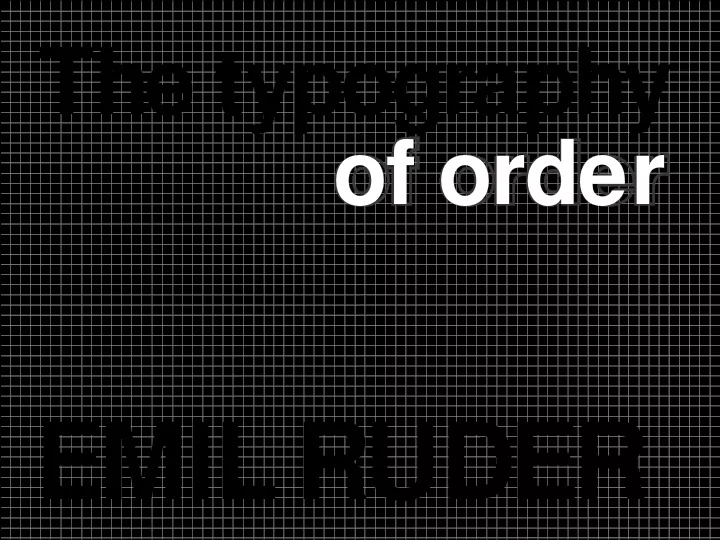

The typography of order EMIL RUDER
1914-1970 • Swiss typographer, born in Zurich • He was professor in basel school of design • He founded the international center for the typographic arts in New York in 1962 • Author of books ein gestaltun Ein Gestaltungslehr buch A Manual of Design - Un Manuel de Creation (Teufen: Niggli, 1967), and Typographie. writer and editor of typografische Monatsblatter (typographic monthly)
SWISS STYLE Typography has one plain duty before it and that is to convey information in writing. No argument or consideration can absolve typography from this duty.A printed workwhich cannot be read becomes a product without a purpose -Emil Ruder
CHARACTERISTICS • strict grids • no decorative elements • photographs preffered over illustrations
FORM AND FUNCTION
MINIMALISM “Perfection is achieved, not when there is nothing left to add, but when there is nothing left to remove.” -Antoine de Saint-Exupéry
Typographer must be ableto take the impersonal view; wilful individuality and emotion have little place in his work. -Emil Ruder
SPACE AND COUNTER SPACE The material contains usefulness, the immaterial imparts essence. -Lao Tse
WRITING AND PRINTING A good designer must refrain from mixing writing and printing. the spontaneity of handwriting can only be distantly approached and never attained by printing.
The many active contacts between people from every country today leaves no scope for typefaces with a pronounced national character. -Emil Ruder
INFLUENCES Teaism Bauhaus
EXAMPLES
PRODUCTS
HELVETICA
VISUAL COMMUNICATION
Work by Emil Ruder
Someone Who Worked With him Armin Hofmann (HonRDI) is a Swiss graphic designer. Hofmann followed Emil Ruder as head of the graphic de- sign department at the Basel School of Design (Schule für Gestaltung Basel) and was instrumental in developing the graphic design style known as the Swiss Style. He is well known for his posters, which emphasised economical use of colour and fonts, in reaction to what Hofmann regard- ed as the “trivialization of colour.” His posters have been widely exhibited as works of art in major galleries, such as the New York Museum of Modern Art.
CONCLUSIONS Before doing this research,I never reallly thought about the inerac- tion of type and cuture,society,philosophy etc.Knowing the story behind how typefaces have evolved i think will make me more sen- sitive and aware of thier characteristics and hence i will be able to use them effectively.I feel ornamentation distracts from the message and their is beauty in simplicity.It was really interesting howoriental philosophers have infmuenced the appreciation of counter space among designers. Negativespace is as important as the positive space.Using non or- namental typefaces also makes one much more sensitive about composition which is what a typographers job really is. - Siddharth
After doing research on Emil ruder and overall typography, I realized typography is really vast subject and there are many things related to is such as philosophy, culture etc. There are many typographer and all of them have differ- ent point of view. But I liked the way Emil ruder is perceiv- ing typography. Partly I agree with his point that typographer should work with other font and create composition than creating it. Also his principle related to negative and positive spaces is quite interesting. I learnt many things about typography from this assignment. And it’s really important how and where you use which font. In future I’ll be very careful while using fonts. -Mitwa
Before this typography couse I didnt know there was anything like ty- pography. I wasn’t aware that fonts had families and that they had so much history, serif and sans serif, roman gothic. I have learnt what makes a font legible, that is needs to be balanced, the positive and negative space within a letter in a font is as important as the posive and negative space outside a letter. I didn’t think of using font alone to design something. I have learnt that using a simple legible font makes you pay more attention to the composition. However, I do not believe that one font should be used for everything because font does contribule to the composition, it does evoke an emotion and it can enhance your design. I have learnt that every font has its place. That Microsoft Word is not a good font editing tool. From Emil Ruder I have learnt that fjrst the funtion should be given importance and only then the form. - Jonathan
Thank You
Recommend
More recommend